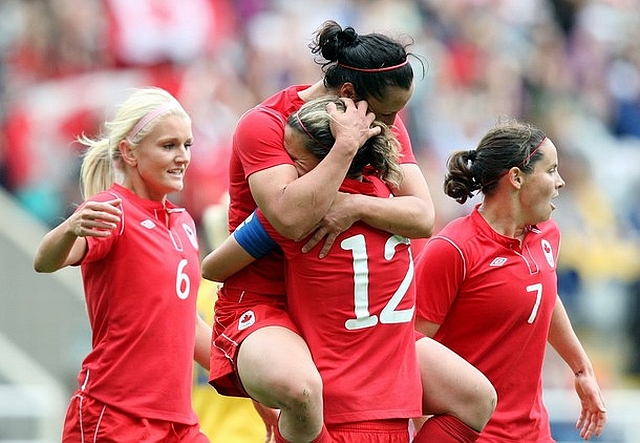With Canada Soccer fighting a six-point sanction from FIFA on and off the pitch, we learn more about its drone spying at the Paris Olympics

In March of this year, Bev Priestman had a problem. One of the Canadian women’s team manager’s analysts had refused to engage in “spying” on opposing teams. What was she to do?
The analyst, tasked with providing information on opposing teams had written a tersely-worded email putting into writing a conversation they’d had with Priestman on “spying.”
In point form, they give three good reasons they don’t want to do it: “Morally,” then “My own reputation within the analysis field,” then “Potentially being unable to fulfil my role on a matchday.”
“Just wanted to confirm that you will not be asking me to fulfil the role of “spying” in the upcoming camp & future camps,” the analyst wrote.
Priestman reached out to an individual with the same name as an HR consultant used by the national team about the “formal email on ‘spying’ ” she had received.
“I know there is a whole operation on the Men’s side with regards to it,” she wrote, adding that she asked the analyst “to propose a alternative solution as for scouting it can be the difference between winning and losing and all top 10 teams do it.
“Just after guidance really as to what from a HR stand point I can do or do I need to find another solution in resourcing? It’s a tricky one and it’s formal for a reason I feel…”
These were the emails that got Bev Priestman kicked out of the Olympics and banned from soccer for a year, according to FIFA’s reasons for its sanctions against Priestman, the Canadian Soccer and two of its coaches released Monday.
It’s part of a very stupid debacle that started when one of the two coaches, Joey Lombardi, got arrested July 22 while trying to fly a drone over a New Zealand practice in St. Etienne. It’s rippled out to include a six-point deduction against the defending Olympic champions, as well as allegations of systematic spying which threaten to soil two of the best things to happen for long-suffering Canadian fans: women’s team’s gold medal and qualification for the 2022 men’s World Cup.
Canada is fighting: On Sunday, the women’s team beat France 2-1 to stay alive in the tournament, despite the penalty, and on Monday, Canada Soccer announced that it was appealing the points penalty because it “unfairly punishes the athletes” and “goes far beyond restoring fairness to the match against New Zealand,” with a date Tuesday at the Court of Arbitration for Sport.
Canada women’s soccer legends Christine Sinclair and Stephanie Labbé said they hadn’t used the footage. Vanessa Gilles, the goalscorer on Sunday, gave an interview where she said they were powered by the desire “to prove people wrong when all this shit is coming out about our values, about our representation as Canadians. It’s not us, we’re not cheaters, we’re damned good players.”
All this has been a massive psychological blow for fans who see themselves as backing an underdog, a scrappy hard-working group of good kids struggling to make space in Canada’s hockey-mad sports culture for soccer and to make space for Canadians in a sport that rarely takes them seriously either. The points penalty has become another hurdle to leap, or evidence of some lingering unfairness against Canada, even though we’re the ones that cheated.
After Canada asked for the reasons for its decision, FIFA has posted its quasi-judicial ruling recommending the six-point, C$310,000 fine against the federation, finding it broke a rule in the competition rulebook against flying drones over training sites, and banning Priestman, Lombardi and assistant coach Jasmine Mander for a year.
As a court reporter and occasional soccer writer and talker, this lit my brain up in a particular way. The decision goes some way to confirming what is reported through anonymous sourcing in a number of articles by TSN’s Rick Westhead: that Canada Soccer coaches asked staffers on its men’s and women’s teams to watch opposing teams practices long before Lombardi’s arrest at the Stade de Drury.
Lombardi himself claimed in a statement filed with FIFA that he did his droning on his own account because he “wanted to impress the Canadian Women’s technical staff with informed/accurate analysis to elevate my role for future opportunities with the team.” Tragically for him, he went once without getting caught, but didn’t get anything usable, and came back for a second try at it.
Canada Soccer first called him an “unaccredited analyst” before later admitting he was an employee, and Priestman said it doesn’t represent “the values we stand for” and valiantly offered to withdraw from the New Zealand game.
But when the association’s CEO Kevin Blue sent Priestman home altogether, saying in a statement that “additional information has come to our attention regarding previous drone use against opponents,” FIFA’s disciplinary body, who had not received this info, asked, hey, uh, where’s our copy?
That ended up being the emails between Priestman, the analyst and the HR consultant. Canada Soccer has blamed it all on former men’s and women’s national team coach John Herdman, according to the decision.
“Canada is investigating the history of this matter, but we suspect that the practice of using a drone
stems back to John Herdman when he was the head coach of the women’s national team,” the CSA wrote in a statement to FIFA. “In other words, this was a practice started by one person – John Herdman – and continued by Bev Priestman. It was not facilitated by the federation.”
Herdman, now behind the bench in MLS at Toronto FC, denied using drones or spying “at an Olympic Games or World Cup.” But he and the men’s program have featured heavily in Westhead’s reporting, with a July 26 story offering the scene of Herdman showing drone footage to players ahead of a World Cup qualifier against Honduras in August 2021.
Two days later, Herdman was quoted in an AP story about Honduras reportedly stopping a training session after seeing a drone overhead.
“I’d imagine there’s probably a lot of people in Canada that fly drones, I’m sure,” Herdman is quoted as saying the day before. “I know for sure we won’t be heading into people’s countries too early because with drones these days, people can obviously capture footage. You’ve got to be really careful. So yeah, you got to be careful in CONCACAF. It’s a tricky place.”
France is, indeed, being very careful about drones this Olympics, as Lombardi now knows after spending three days in jail and getting an eight-month suspended sentence. In the decision, FIFA notes that Canada was told at least three times that the official tournament rules this year banned the use of drones, which is one of the two breaches the federation is accused of.
The other is “offensive conduct or violation of the principles of fair play,” or the idea that drone spying creates an uneven playing field by giving teams “real-time aerial views and data that are not accessible to others.” It violates the integrity of the sport by allowing “access to elements, tactics, and other preparation actions” that the team wants kept private, FIFA argued.
It highlights the high importance of the Olympics and a country’s national team and the need for a sentence that’s proportionate but also deters others, saying Canada’s breach “merited severe consequences affecting their standing in the competition.”
Another theme of Westhead’s reporting, reflected in Priestman’s email, is that Canada was looking for any advantage it could get, under the impression that every team was doing something similar.
Former Chelsea legend and onetime Montreal Impact striker Didier Drogba shyly told CBC’s Ariel Helwani that “it happens, it happens few times … for me, I mean, they just caught them, that’s it.”
Tyler Adams, who plays for the US men’s team and for Bournemouth in England, told the Soccer Cooligans podcast that “every team does it in some capacity,” either with drones or more pedestrian means of spying.
In 2019, noted bucket-sitter Marcelo Bielsa’s Leeds United team caught a fine when an intern was spotted outside a training session for second-tier rivals Derby County with binoculars. In an hour long slideshow slash press conference, Bielsa defended the practice as common in South America and wryly noted that it didn’t stop him getting blown out by Barcelona as Athletic Bilbao manager.
“Even though going and watching an opponent is not useful, it allows me to keep my anxiety low,” Bielsa said, closing his address by saying, “I repeat: Why do I do it? Because I think I’m stupid.”
For all this heartache, what great advantage did drone spying give Herdman? From Westhead:
“Herdman explained that the Honduran team favoured a 4-4-2 formation with either a medium or a high press and that simplicity was the key to Canada being successful in the important game, the source said.
“Herdman emphasized “turning the Honduran team around,” in the first 15 minutes, according to the source.”
Truly ground-breaking stuff, the kind of basic insight anyone could get by watching any of a team’s previous matches or media interviews. Canada in fact failed to turn the Honduran team around and drew 1-1 after getting a penalty in the 66th minute.
That leads to my favourite take on this, which comes from Vancouver Whitecaps coach Vanni Sartini, via Har Journalist. Sartini, whose team trains in the centre of a university campus, says he’s “against secrecy,” and never closes his practices anyways.
“We never try to spy on anyone and we don’t care if anyone comes to spy, because there’s no advantage to doing this. We are in 2024, where everyone can see every game of every team. Every action, every set play everywhere. The marginal gains to send someone to see a training session is almost zero.”
For “almost zero” gain, Canada Soccer has sent itself again into crisis, after dealing with the horror of sex abuse allegations against a women’s youth national team coach which an investigation found that Canada Soccer mishandled, and an ongoing financial crisis which saw matches canceled when players refused to play due to a labour dispute hampered by a contract which puts a clamp on the association’s cash flow.
Westhead, who has a track record of tough but fair reporting on Canada Soccer’s foibles, has come under criticism for the negative press from fans grasping at straws for a person to blame, with his former colleague Kristian Jack telling a OneSoccer panel Monday that Canadians can’t look for excuses.
“It’s a hard look in the mirror. Canadians have to stand on a high moral ground … this is our country doing it right now,” Jack said. “If you look at it, it has not been a good few years for what Canadians stand for in terms of ethic behaviour, how you treat people.”
The organization’s new general secretary, Kevin Blue, who comes from golf, was supposed to be the start of a new chapter, with new men’s coach Jesse Marsch leading the program to a transcendent Copa America and Priestman given a chance to expand her legacy after the gold medal win.
Instead, Canada Soccer is fighting from the moral low ground, muddying the country’s reputation and playing without a head coach — all three things their analyst had warned them about in March. If only they had fully read that “formal email on ‘spying’.”






